Related Research Articles

Ernst Theodor Amadeus Hoffmann was a German Romantic author of fantasy and Gothic horror, a jurist, composer, music critic and artist. His stories form the basis of Jacques Offenbach's opera The Tales of Hoffmann, in which Hoffmann appears as the hero. He is also the author of the novella The Nutcracker and the Mouse King, on which Pyotr Ilyich Tchaikovsky's ballet The Nutcracker is based. The ballet Coppélia is based on two other stories that Hoffmann wrote, while Schumann's Kreisleriana is based on Hoffmann's character Johannes Kreisler. See also Schumann's Fantasiestücke, Op. 12.

The Grand Duchy of Posen was part of the Kingdom of Prussia, created from territories annexed by Prussia after the Partitions of Poland, and formally established following the Napoleonic Wars in 1815. Per agreements derived at the Congress of Vienna it was to have some autonomy. However, in reality it was subordinated to Prussia and the proclaimed rights for Polish subjects were not fully implemented. The name was unofficially used afterward for denoting the territory, especially by Poles, and today is used by modern historians to refer to different political entities until 1918. Its capital was Posen.

The Province of Posen was a province of the Kingdom of Prussia from 1848 to 1920. Posen was established in 1848 following the Greater Poland Uprising as a successor to the Grand Duchy of Posen, which in turn was annexed by Prussia in 1815 from Napoleon's Duchy of Warsaw. It became part of the German Empire in 1871. After World War I, Posen was briefly part of the Free State of Prussia within Weimar Germany, but was dissolved in 1920 when most of its territory was ceded to the Second Polish Republic by the Treaty of Versailles, and the remaining German territory was later re-organized into Posen-West Prussia in 1922.

Wolsztyn is a town in western Poland, on the western edge of Greater Poland Voivodeship. It is the seat of Wolsztyn County, and of the smaller administrative district of Gmina Wolsztyn.

Polish plait, Koltun in Polish meaning matted, less commonly known in English as plica or trichoma, is a formation of hair. This term can refer to either a hairstyle or a medical condition. It also relates to the system of beliefs in European folklore, and healing practices in traditional medicine in medieval Polish–Lithuanian Commonwealth that supported neglected, matted hair as an amulet, or as a catchment for illness leaving the body.

The Princes Czartoryski Museum – often abbreviated to Czartoryski Museum – is a historic museum in Kraków, Poland, and one of the country's oldest museums. The initial collection was formed in 1796 in Puławy by Princess Izabela Czartoryska. The Museum officially opened in 1878.
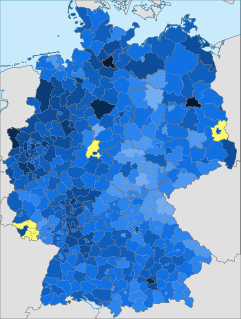
Poles in Germany are the second largest Polish diaspora (Polonia) in the world and the biggest in Europe. Estimates of the number of Poles living in Germany vary from 2 million to about 3 million people living that might be of Polish descent. According to the latest census, there are approximately 2,006,410 Poles in Germany. The main Polonia organisations in Germany are the Union of Poles in Germany and Congress of Polonia in Germany. Polish surnames are relatively common in Germany, especially in the Ruhr area.

Heinrich Caro, was a German chemist.

C. Bechstein Pianoforte AG is a German manufacturer of pianos, established in 1853 by Carl Bechstein.
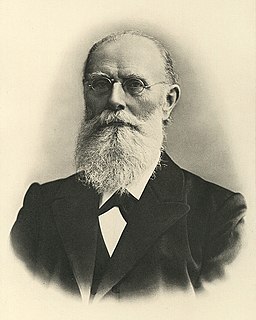
Franz Wüllner was a German composer and conductor. He led the premieres of Wagner's Das Rheingold and Die Walküre, but was much criticized by Wagner himself, who greatly preferred the more celebrated conductors Hans von Bülow and Hermann Levi.
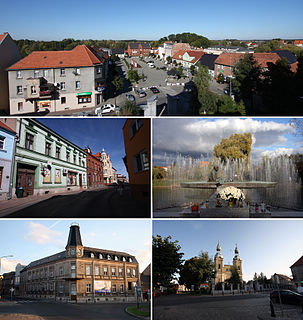
Zbąszyń is a town in western Poland, in Greater Poland Voivodeship, in Nowy Tomyśl County. It is the administrative seat of Gmina Zbąszyń.
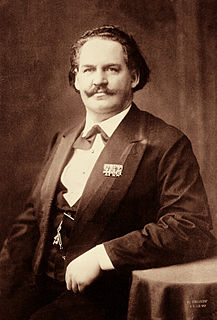
Friedrich Wilhelm Carl Bechstein was the maker of C. Bechstein pianos and the founder of C. Bechstein Pianofortefabrik.
Hermann von Gottschall was a German chess master, son of the poet Rudolf Gottschall who was also a noted chess player.

Adolf Jensen was a German pianist, composer and music teacher.
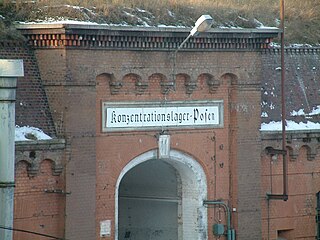
Fort VII, officially Konzentrationslager Posen, was a Nazi German death camp set up in Poznań in German-occupied Poland during World War II, located in one of the 19th-century forts circling the city. According to different estimates, between 4,500 and 20,000 people, mostly Poles from Poznań and the surrounding region, died while imprisoned at the camp.

Marek Prawda is a Polish sociologist and diplomat. Since April 2016 he is Head of Representation - Poland at European Commission.
Drezden is Siarhei Mikhalok’s Belarusian and Ukrainian electronic band.
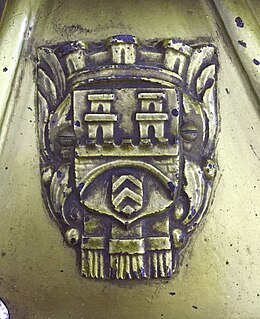
Th. Mann & Co. was a German piano factory, existing in Bielefeld, Prussian Province of Westphalia, from 1836 until 1942, as well as instrument shop for pianos and harmoniums with temporary branch offices in Gütersloh, Herford, Detmold, Rinteln and Paderborn.
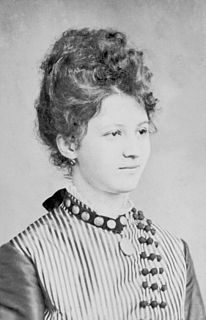
Laura Rappoldi was an Austrian-German pianist.
George Washington Pittrich was a German composer and Kapellmeister.
References
- ↑ rom245 (2014-07-19). "Firma Carl Ecke Posen, Berlin, Drezden". Wirtualne Muzeum Zabytkowych Instrumentów Muzycznych (in Polish). Retrieved 2019-04-17.
- ↑ "Carl Ecke Obituary". Photobucket.
- ↑ rom245 (2014-07-19). "Firma Carl Ecke Posen, Berlin, Drezden". Wirtualne Muzeum Zabytkowych Instrumentów Muzycznych (in Polish). Retrieved 2019-04-17.
- ↑ "Historia – Ars Polonica". polonica11.rssing.com. Retrieved 2019-04-17.